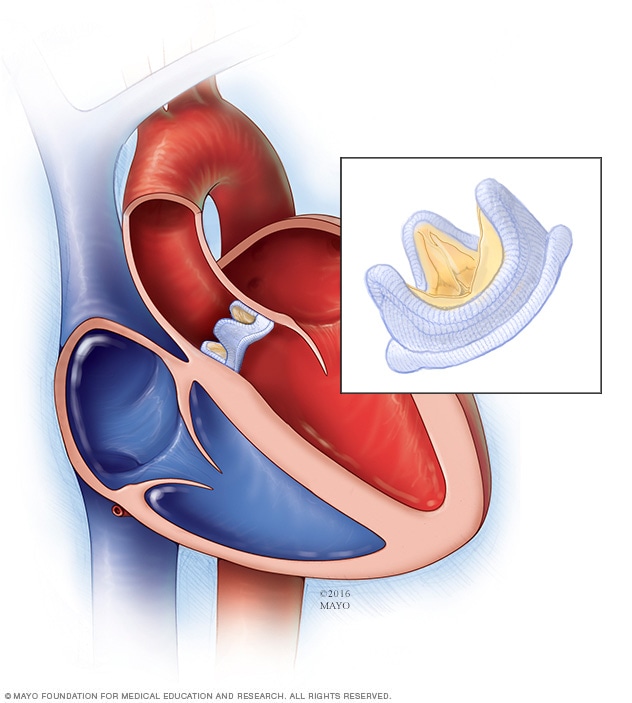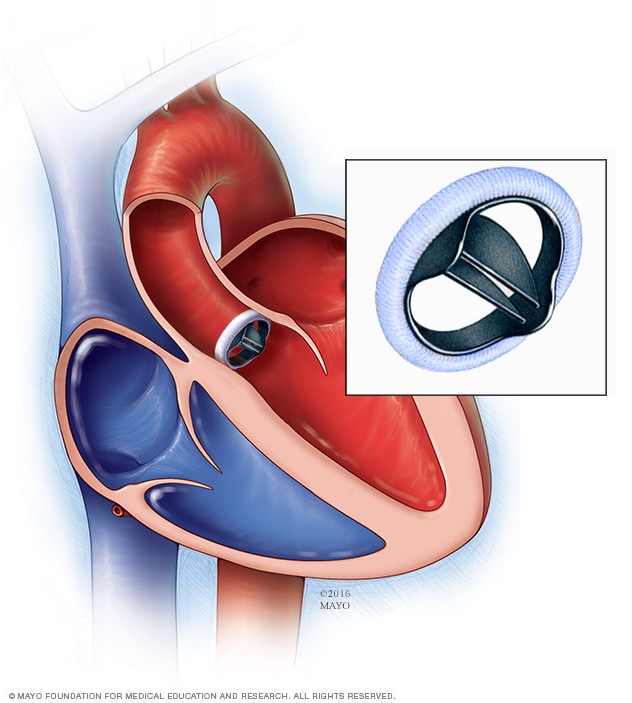Diagnosis
To diagnose aortic valve regurgitation, a member of your health care team examines you. You usually are asked questions about your symptoms and health history. You also might be asked about your family's health history.
Your blood pressure is checked using a cuff, usually placed around your arm. A device called a stethoscope is used to listen to your heart. Your health care professional may hear an irregular sound called a heart murmur.
You may be referred to a doctor trained in heart diseases, called a cardiologist.
Tests
Tests may be done to check your heart health and learn the cause of aortic valve regurgitation. Tests may include:
-
Echocardiogram. Sound waves are used to create pictures of the beating heart. This test shows how blood flows through the heart and heart valves. It can show the aortic valve and the aorta. An echocardiogram can help tell how severe aortic regurgitation is.
There are different types of echocardiograms. If a standard test doesn't provide enough information, you may have one called a transesophageal echocardiogram. This type creates pictures of the heart from inside the body. It gives a detailed look at the aorta and aortic valve.
- Electrocardiogram (ECG or EKG). An ECG measures the electrical activity of the heart. It shows how fast or how slowly the heart is beating. Sticky patches are placed on the chest and sometimes the arms and legs. Wires connect the electrodes to a computer, which displays the results.
- Chest X-ray. A chest X-ray can show if the heart or aorta is enlarged. It also can help determine the condition of the lungs.
- CT scan of the heart. Also called a cardiac CT, this test uses a series of X-rays to make a detailed image of the heart. You lie on a table inside a doughnut-shaped machine. A CT scan also can help confirm a tear in the aorta.
- Exercise tests or stress tests. These tests often involve walking on a treadmill or riding a stationary bike while the heart is checked. Exercise tests show how the heart reacts to physical activity. The tests can show whether valve disease symptoms occur during exercise. If you can't exercise, you might get medicines that affect the heart like exercise does.
- Cardiac MRI. This test uses a magnetic field and radio waves to make detailed pictures of the heart, including the aorta and aortic valve.
-
Cardiac catheterization. This test isn't always used to find aortic valve regurgitation. But it may be done if other tests aren't able to diagnose the condition or determine how serious it is. Cardiac catheterization may be done before valve replacement surgery to check for blockages.
In cardiac catheterization, a doctor inserts a long, thin flexible tube called a catheter in a blood vessel, usually in the groin or wrist. It's guided to the heart. Dye flows through the catheter to arteries in the heart. The dye helps the arteries show up more clearly on X-ray images and video.
Heart valve disease stages
After testing confirms a diagnosis of heart valve disease, your health care team may tell you the stage of disease. Staging helps determine the most appropriate treatment.
The stage of heart valve disease depends on many things, including symptoms, disease severity, the structure of the valve or valves, and blood flow through the heart and lungs.
Heart valve disease is staged into four basic groups:
- Stage A: At risk. Risk factors for heart valve disease are present.
- Stage B: Progressive. Valve disease is mild or moderate. There are no heart valve symptoms.
- Stage C: Asymptomatic severe. There are no heart valve symptoms but the valve disease is severe.
- Stage D: Symptomatic severe. Heart valve disease is severe and is causing symptoms.
More Information
Treatment
Treatment of aortic valve regurgitation depends on:
- How serious the condition is.
- The symptoms, if any.
- Whether the condition is getting worse.
The goals of aortic valve regurgitation treatment are to ease symptoms and prevent complications.
If your symptoms are mild or you don't have symptoms, you may only need regular health checkups. You may need regular echocardiograms to check the health of the aortic valve. Heart-healthy lifestyle changes also are usually recommended.
Medications
If you have aortic valve regurgitation, you may be given medicines to:
- Treat symptoms.
- Reduce the risk of complications.
- Lower blood pressure.
Surgery or other procedures
Biological valve replacement

Biological valve replacement
In a biological valve replacement, a valve made from cow, pig or human heart tissue replaces the damaged heart valve.
Mechanical valve replacement

Mechanical valve replacement
In a mechanical valve replacement, an artificial heart valve made of strong material replaces the damaged valve.
Surgery may be needed to repair or replace the diseased valve, especially if the condition and symptoms are severe. Heart valve surgery may be needed even if aortic regurgitation isn't severe or when there are no symptoms.
The decision to repair or replace a damaged aortic valve depends on:
- Your symptoms.
- Your age and overall health.
- Whether you need heart surgery to correct another heart condition.
If you're having another heart surgery, surgeons may do aortic valve surgery at the same time.
Surgery to repair or replace an aortic valve may be done as open-heart surgery. This involves a cut, also called an incision, in the chest. Sometimes surgeons can do minimally invasive heart surgery to replace the aortic valve.
Surgery for aortic valve regurgitation includes:
- Aortic valve repair. To repair an aortic valve, surgeons may separate valve flaps, also called cusps, that have connected. They might reshape or remove excess valve tissue so that the cusps can close tightly. Or they might patch holes in a valve. A catheter procedure may be done to place a plug or device in a leaking replacement aortic valve.
-
Aortic valve replacement. The surgeon removes the damaged valve and replaces it. The replacement might be a mechanical valve or one made from cow, pig or human heart tissue. A tissue valve also is called a biological tissue valve.
Sometimes, surgeons can do minimally invasive heart surgery to replace the aortic valve. This procedure is called transcatheter aortic valve replacement (TAVR). It uses smaller incisions than those used in open-heart surgery.
Sometimes the aortic valve is replaced with your own lung valve, also called the pulmonary valve. Your pulmonary valve is replaced with a biological lung tissue valve from a deceased donor. This more complicated surgery is called the Ross procedure.
Biological tissue valves break down over time. Eventually, they may need to be replaced. People with mechanical valves need blood thinners for life to prevent blood clots. Ask your health care team about the benefits and risks of each type of valve.
More Information
Clinical trials
Explore Mayo Clinic studies testing new treatments, interventions and tests as a means to prevent, detect, treat or manage this condition.
Lifestyle and home remedies
While lifestyle changes can't prevent or treat your condition, your health care team might suggest that you practice some heart-healthy habits. These may include:
- Eat a heart-healthy diet. Enjoy a variety of fruits and vegetables, low-fat or fat-free dairy products, poultry, fish, and whole grains. Stay away from saturated and trans fats and excess salt and sugar.
- Stay at a healthy weight. Aim to keep a healthy weight. If you're overweight or obese, your health care team may recommend that you lose weight. Ask what goal weight is healthy for you.
- Get regular exercise. Aim to include about 30 minutes of physical activity, such as brisk walks, into your daily fitness routine. Ask your care team for advice before you start to exercise, especially if you're thinking about playing competitive sports.
- Don't smoke or use tobacco. If you smoke, quit. Ask your care team about resources to help you quit smoking. Joining a support group may be helpful.
- Control high blood pressure. Uncontrolled high blood pressure increases the risk of serious health problems. Get your blood pressure checked at least every two years if you're 18 or older. If you have risk factors for heart disease or are over age 40, you may need more-frequent checks.
- Get a cholesterol test. Get your first cholesterol test when you're in your 20s and then another at least every 4 to 6 years. Some people may need to start testing earlier or have more-frequent checks.
- Manage diabetes. If you have diabetes, tight blood sugar control can help keep your heart healthy.
- Practice good sleep habits. Poor sleep may increase the risk of heart disease. Adults should aim to get 7 to 9 hours of sleep daily. Go to bed and wake at the same time every day, including on weekends. If you have trouble sleeping, talk with your health care team about strategies that might help.
Pregnancy and aortic valve regurgitation
Careful and regular checkups are needed for those who have heart valve disease, including aortic valve regurgitation, during pregnancy. If you have a severe heart valve condition, you might be told not to get pregnant to reduce the risk of complications.
Preparing for your appointment
If you think you might have symptoms of heart valve disease, make an appointment for a health checkup. You may be referred to a doctor trained in heart diseases. This doctor is called a cardiologist.
If you have aortic valve regurgitation, consider being cared for by a medical team that specializes in heart valve disease.
Here's some information to help you prepare for your appointment.
What you can do
- Be aware of pre-appointment restrictions. When you make the appointment, ask if there's anything you need to do in advance. For example, you may be told not to eat or drink for a short period before a cholesterol test.
- Write down your symptoms and how long you've had them. Include any that seem unrelated to heart valve disease.
- Write down important medical information, including any family history of heart valve disease, and any major stresses or recent life changes.
- Make a list of all medicines, vitamins and supplements you take. Include dosages.
- Take a family member or friend with you to the appointment, if possible. Someone who joins you can help remember what your health care team says.
- Write down questions to ask your health care team.
For aortic valve regurgitation, questions to ask your health care team include:
- What is the likely cause of my symptoms?
- Are there any other possible causes?
- What tests do I need?
- What treatment do you recommend?
- Are there any other treatment options?
- Will I need surgery? If so, what surgeon do you recommend for aortic valve surgery?
- I have other health conditions. How can I best manage them together?
- Are there restrictions I need to follow?
- Should I see a specialist?
Don't hesitate to ask any other questions.
What to expect from your doctor
You are usually asked many questions, including:
- When did your symptoms begin?
- How often do you notice your symptoms?
- How bad are your symptoms?
- What, if anything, seems to improve your symptoms?
- What, if anything, appears to worsen your symptoms?
- Do you have heart disease in your family?
Oct. 04, 2023